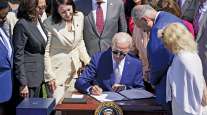Senior Reporter
Infrastructure Bill Possible With Trump, Congressional Leadership, Chamber Says

WASHINGTON — With the next round of infrastructure talks between President Donald Trump and House Speaker Nancy Pelosi expected later this month, an influential group in Washington will keep working the sidelines to get a long-term bill across the finish line.
READ MORE: Trump, Speaker Nancy Pelosi to discuss infrastructure proposals April 30
The U.S. Chamber of Commerce marked infrastructure policy as a top issue for its members this year. Economic progress suffers when traffic congestion delays deliveries and inadequate freight and transit facilities impede mobility.
The solution is obvious, the organization says: Repair and modernize the country’s freight and passenger corridors as a benefit for businesses and residents from every background.

“Everyone in this country is a winner if the Congress can do something on this issue,” Ed Mortimer, the Chamber’s transportation and infrastructure leader, told Transport Topics on April 22. He spoke from the Chamber’s headquarters across from the White House.
Pelosi (D-Calif.), Trump and Senate Republican leaders have indicated a willingness to advance an infrastructure package this year. Their task is to compromise on a funding approach for such a bill.
The federal government has yet to ensure sustainable funding for the country’s intricate network of roads, tunnels, bridges, pipelines, ports and waterways. Highway projects are backed primarily through dwindling revenue from fuel taxes.
The business group’s answer to the funding dilemma is a 25 cents-per-gallon fuel tax increase over five years. The Chamber claims the increase would be the quickest approach for ensuring the solvency of a highway maintenance account known as the Highway Trust Fund.
“We’re willing to work with members on both sides of the aisle to come up with a final solution. We’re not wedded to our proposal, but our goal has been to provide a long-term sustainable funding source for the Highway Trust Fund,” Mortimer said.
“We know that raising revenue is a difficult thing. It’s a difficult thing for the [U.S.] Chamber of Commerce. We don’t normally support raising revenue, but this is an area that there’s a federal role,” he added.
The fund relies on revenue from the 24.4 cents-per-gallon diesel tax and 18.4 cents-per-gallon gas tax set in 1993. Analysts estimate the fund will approach insolvency in about two years.
Nearly three dozen state legislatures in recent years have approved funding boosts primarily through fuel tax increases to repair and expand big-ticket projects. Governors and state lawmakers cited federal inaction to justify their votes.
Thus far, a few Democrats on Capitol Hill support raising fuel taxes. Senate Republican leaders sounded their opposition to an increase.
We are glad @realDonaldTrump @SpeakerPelosi and @SenSchumer are meeting to discuss path forward on infrastructure plan. @USChamber is committed to work with D’s and R’s to enact infrastructure plan this year!#InfrastructureNow #BuildForTomorrow https://t.co/9sLjmXtb3S — ChamberMoves (@ChamberMoves) April 24, 2019
Trump, however, is said to have backed an increase, just not publicly. In private conversations at the White House last year with congressional transportation leaders, several lawmakers insist the president touted a funding proposal similar to the Chamber’s fuel tax increase. The White House has not walked back the lawmakers’ account of the meeting, a signal to the Chamber and other groups that confirms Trump’s remarks.
“We really need President Trump to lay out the importance to getting this done. It’s not going to happen unless all three branches of government come together. The president has made a lot of statements on the issue, but continuing to support members of both sides of the aisle to work together on this is going to be critical to getting final action on a bill. And he’s gotta sign it,” Mortimer said.
Ideally, legislation would be considered in the House during May or possibly June, Mortimer explained. Senate action would either coincide or be scheduled soon after. After policy differences are resolved, the bill would have a chance of advancing to the White House before August. The Chamber, Mortimer added, does not have a preference if an infrastructure package and a reauthorization of the 2015 FAST Act five-year highway law are taken up separately, so long as long-term funding is approved.
An inability to wrap up infrastructure policy before the summer recess would bring the matter to the fall legislative calendar, where the fiscal appropriations bills will dominate floor time. No action on infrastructure by the end of the year brings it to 2020, when the presidential contest is expected to push legislative priorities to 2021. Waiting two years could lead to short-term extensions of the FAST Act.
As Mortimer put it, “Our concern is that, this industry just suffered through 30-some extensions to get to the FAST Act. We don’t want a repeat of that.”
Since the start of the year, the Chamber and other stakeholders have urged the president and Republicans and Democrats on Capitol Hill to appreciate the potential benefits securing long-term funding and a modernization blueprint would have for the economy. Through public forums, press conferences and testimony before Congress this year, Mortimer contends the Chamber has “raised the decibel level.”
“At the end of the day, when these members of Congress and the president are up for re-election next year, this is something they can all tout as a huge victory for the American people,” Mortimer said. “If they don’t accomplish this, I think there’s going to be a lot of explaining on all sides of the aisle, about why they were unable to come together to do an infrastructure bill.”




